Disclaimer: In Real Life is a platform for everyday people to share their experiences and voices. All articles are personal stories and do not necessarily echo In Real Life’s sentiments.
Imagine going through your day as usual – maybe you’re out for lunch, or you’re working from home – nothing is out of the ordinary… until you randomly decide to check your bank statement and you’re hundreds of ringgit short.
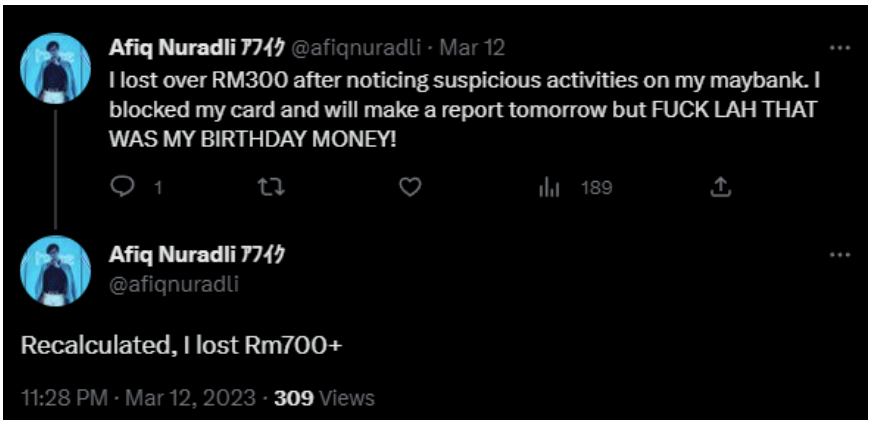
Afiq discovered he suddenly lost over RM700
A few days ago, Afiq shared on Twitter about his experience being charged by Facebook for ads he didn’t buy. When he looked into the matter, he found that his bank statement wrote “SALE FACEBK *Set of numbers and alphabets”. After adding it all up, Afiq calculated his loss to be RM700+.
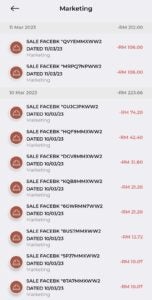 Image courtesy of Afiq Nuradli on Twitter
Image courtesy of Afiq Nuradli on Twitter
Shown here are multiple transactions from 10 March and 11 March, 2023. The information of each transaction shows that it is under Marketing, with the title “SALE FACEBK *HQF9MMXWW2 DATED 10/03/23”
Afiq shares that he had never once put in his own banking details on Facebook. He stated that he had never received notifications for these purchases and they were being done without his knowledge.
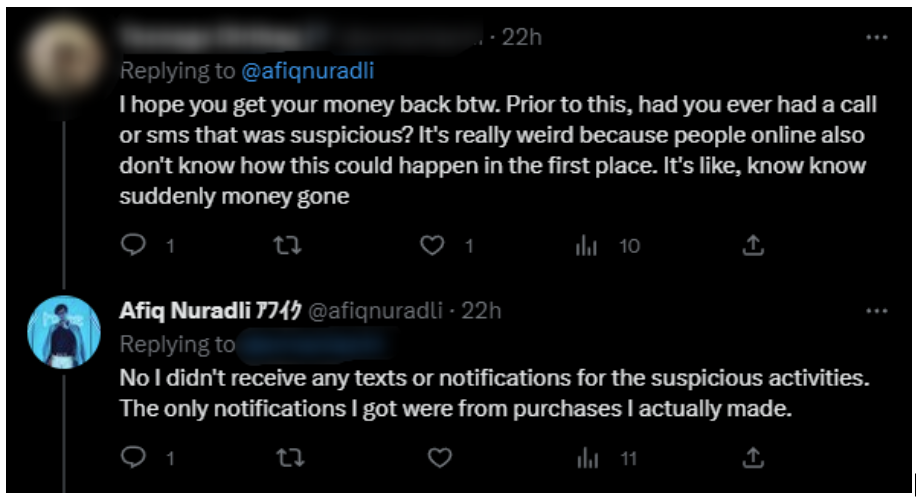 Image screenshot from Afiq Nuradli’s Twitter thread
Image screenshot from Afiq Nuradli’s Twitter thread
Malaysian woman found suspicious activity on her own deactivated Facebook account
Another victim, Dayana, had a similar experience that was even weirder.
Dayana’s Facebook was deactivated for 6 years. She didn’t share any banking information on her Facebook account.
In 2022, she was checking her Maybank statement and found that she was being charged by Facebook for ads that she didn’t even know could be bought.
In addition to that, she discovered that Paypal was also charging her for ads!
She contacted her bank and after investigating, they cancelled all those transactions and refunded her money within the same week.
Unfortunately, she received no further explanation from the bank as to why or how it happened.
Dayana shared with IRL that she has never linked her bank account to any application, and only does online transactions that would require a TAC/SMS to authenticate the purchase.
So Why Is This Happening To So Many Malaysians with Facebook accounts??
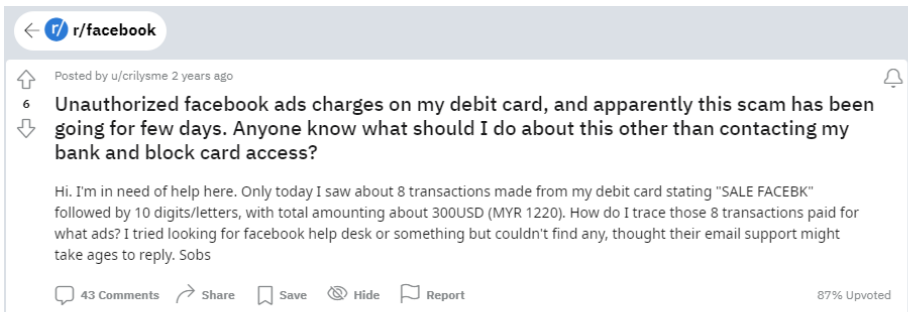 Image screenshot from user crilysme on Reddit
Image screenshot from user crilysme on Reddit
After we looked it up online, it appears this is a common occurrence amongst Malaysians with Facebook accounts. There have been many victims of this online scam, and some of them suspected it was due to accidentally clicking on a dodgy Facebook ad.
According to one user, these victims might have clicked on a Facebook ad by accident, which could make her autofill payment forms on Facebook using her credit card details that may have been saved on other ecommerce platforms.
It is speculated that the ads that they are paying for are likely being used to feed into the cycle in order to scam even more people.
Aside from this, IRL spoke to a former bank fraud analyst for further advice, and he shared that there are 2 other scenarios that could have caused this:
- 1st: Victim enters their card details in a phishing website or their details got acquired when a legit website they use with poor security is hacked
- 2nd: Scammers using algorithms to brute force card numbers got a few and one of them is the victim.
Fortunately, there are effective measures you can take to prevent this from happening to you!
Here’s what you can do to keep your money safe
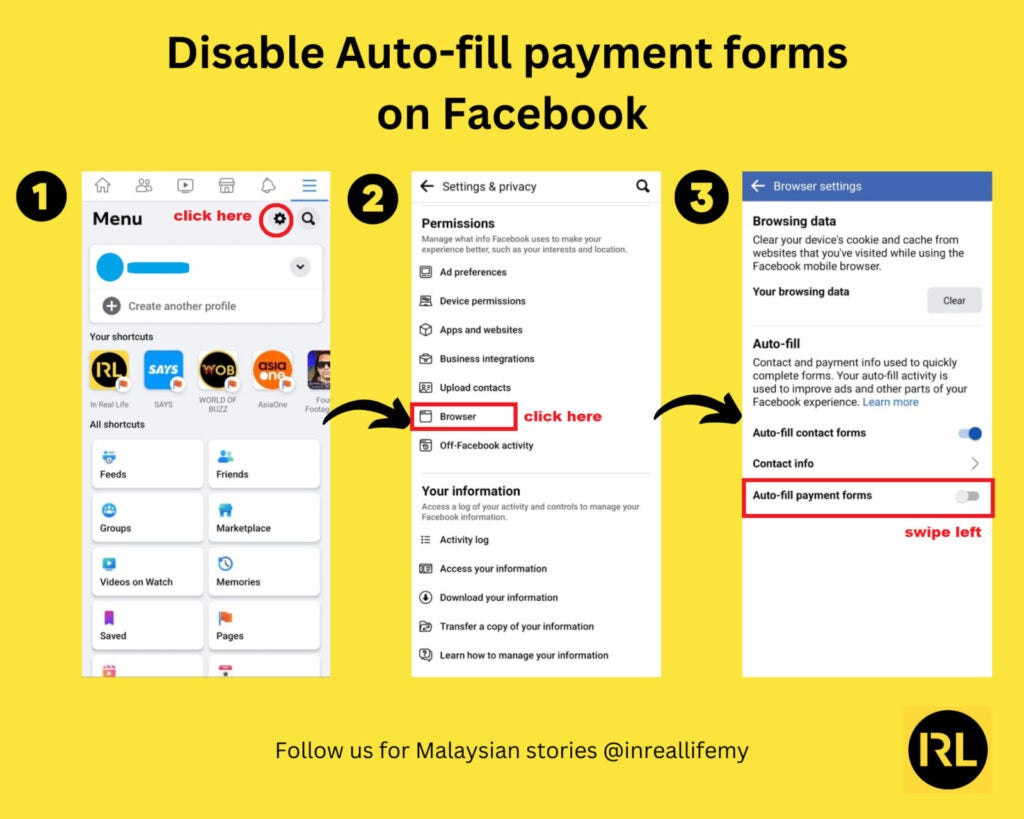
Prevention measures you can take so that this does not happen to you:
- Disable autofill payment forms in Facebook settings
Go to your Facebook, then tap the Setting icons to go to “Settings & Privacy”. Scroll down to “Permissions” then click on “Browser”. Under Auto-fill, go to “Autofill payment forms”, and swipe left to disable it.
- Do not click on any emails with suspicious links.
These emails look almost genuinely like they came directly from the bank. They may ask you for a password change for your account or other personal information, thus gaining access to your bank details.
- Keep your cash savings in multiple bank and e-wallet accounts.
There are a wide range of e-wallets that keep your money secure: Bigpay, Grabpay, TNG Wallet, Boost, MAE, Wise, Kiplepay, Zapp Ewallet to name a few.
If you are a victim of such a scam, here’s what you must do:
- Call the bank immediately and file for a wrongful payment.
The bank will investigate and if fraud is detected will refund your money typically in 2-6 weeks
- Block or freeze any credit cards or debit cards
In some banking apps like MAE, you can use a “killswitch” to block any further transactions from your banking app. E-wallets such as Bigpay also have a “freeze” option that blocks your card from being used for any future transactions.
The moral of the story is, don’t click on any suspicious Facebook ads. Your bank details may end up being auto-filled by Facebook.
For more stories like this, read:
Do you have an interesting story? Email us at ym.efillaerni@olleh
Subscribe to our Telegram for updates.
More from Real People
‘A RM100 fee cost a company 5 years of revenue’ shares M’sian
This story is about a Malaysian who learned that bureaucracy can be defeated simply by not arguing with it.A billing …
‘I quiet-quit, upskilled, and tripled my salary,’ shares M’sian engineer
This story is about a Malaysian who learned that loyalty without leverage leads nowhere in the corporate world.After years of …
‘I did everything right, and it still wasn’t enough’ shares M’sian graduate
This story is about a Malaysian graduate navigating big dreams in a job market where a degree no longer guarantees …















